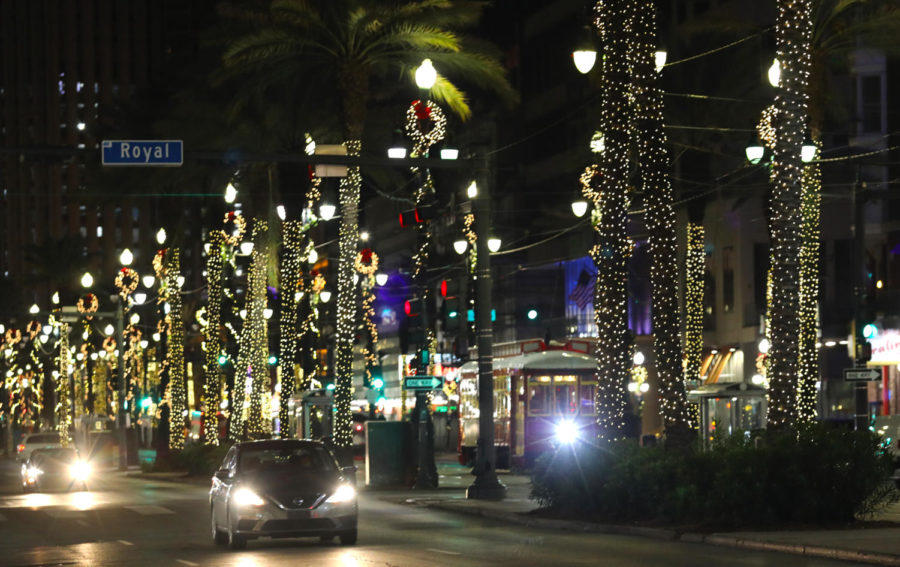Nonprofit finds old hotel taxes may be costing the city millions
The downtown stretch of Canal St. Photo credit: Andres Fuentes
February 19, 2019
What was originally meant to be a temporary move to ease the construction of the Superdome may still be costing the city an estimated $12 million dollars in 2019, according to a recent report.
A recent report from the Bureau of Governmental Research noted that, despite having one of the highest tax rates on a hotel room in the country, the city of New Orleans sees only a small amount of that revenue compared to similar cities.
According to the report, that’s because in 1966, voters chose to impose a new tax on hotel rooms that would help fund the Superdome. In order to ease the burden of this new tax, the city also cut the sales tax on hotel rooms from 2.5 percent to 1.5 percent.
“This was envisioned as a temporary measure to boost the fledgling tourism industry in New Orleans,” wrote the researchers at the Bureau of Governmental Research. “More than half a century later, tourism is thriving. Several new hotel taxes dedicated to tourism marketing and conventions have supported this growth. Yet the city’s tax remains suspended.”
The report calls this missing one percent the “lost penny,” and this penny is worth $12.3 million. That’s money that could go toward municipal costs, such as fixing potholes or street lights in the city. Though the city stands to make $200 million off hotel taxes in 2019 according to the report, only about 10 percent of that revenue is tax that will go back to the city. According to data gathered by the bureau, that’s a rate that is lower than the next six largest parishes. That missing one percent contributes to the city having $15.8 million less than the median of what those other six parishes are getting back for municipal costs.
The bureau recommends that the city find a way to get that missing penny back. But it may not be as easy as simply reimposing that one percent back to the sales tax.
Stephen Perry, CEO of the New Orleans Company, which helps oversee tourism in the city, is worried that a full one percent increase would do more to hurt the city.
“Unfortunately, our elasticity analysis indicates that a 1% increase is too far a stretch and that it presents real competitive issues,” said Perry in a statement. “Tourism and the convention and meetings industry are extremely competitive businesses. If we stop or slow our efforts, or increase taxes inappropriately, the resulting falloff in visitor travel could be devastating to our local economy and to the city’s tax rolls, exacerbating every current challenge.”
Stephen Stuart, a researcher for the Bureau of Government Research, said that they don’t recommend reimposing the full one percent just yet.
“We don’t recommend doing that without a demonstration that doing so would not decrease tourism activity,” he said. “Obviously tourism is an important industry in New Orleans. We think there is a way to restructure hotel taxes to provide the city more revenue while minimizing the impact on the industry.”
Instead, the bureau recommends starting with an increase of 0.55 percent. That would put hotel tax at the same rate that it was before it dropped in July of 2018. According to the report, during the two years that this tax rate was in effect, the tourism industry didn’t seem to be negatively affected. The researchers said that this suggests that the hotel tax could be raised back to this rate again without seeing any negative impact on the tourism industry.
Hotel industry veteran Adam Miller said that, though a few people grumbled about the rising cost, the effect on business then during the two years of the tax increase was negligible.
“They lived with it. When you start talking putting thousands of dollars down, you don’t walk away from it,” said Miller. “If the money’s there, why shouldn’t the city be asking for it?”
With the bureau being confident that the city could get away with the extra .55 percent on the sales tax, they recommend that the difference be made up by redirecting existing hotel tax revenue, possibly from excesses.
The missing one percent isn’t the only problem that the report makes note of. It also causes for a greater transparency, and the need to evaluate how the system is working so that issues like this are fixed in a timely manner.
“We also thought that the structure itself is in need of periodic review. It’s a very complex structure. There needs to be a regular look at efficiency and effectiveness of the structure,” said Stephen.
The Cantrell administration has yet to respond to the bureau’s propositions.








